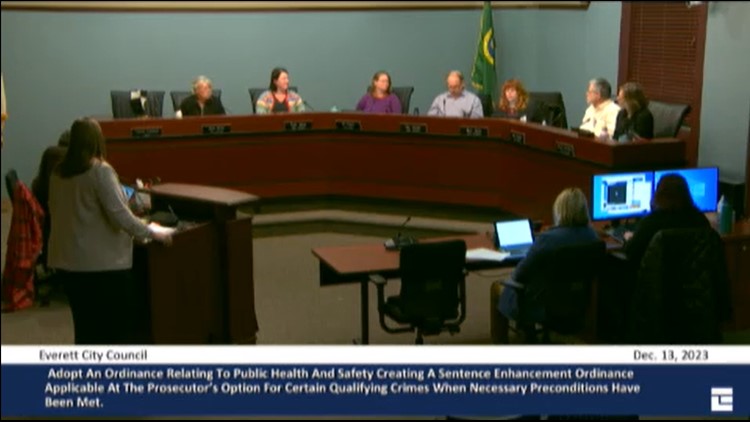EVERETT, Wash. — The Everett City Council is weighing a sentencing enhancement for "repeat offenders," specifically targeting those committing crimes like public drug use, theft, criminal mischief and assault, among others.
The proposal will be voted on at a full council meeting on Wednesday night.
If passed, offenders who commit certain crimes in the city of Everett could be required to serve at least a 30-day jail sentence if they have two or more prior offense convictions from anywhere in Snohomish County in the two years prior.
The crimes that qualify under the ordinance are as follows:
- Assault
- Harassment
- Use of a controlled substance in public
- Loitering for the purpose of engaging in drug-related activity
- Theft
- Criminal mischief
- Trespass
- Vehicle prowling
- Any of these crimes' analogs in state, county, or city law
The sentence enhancement will not be applied automatically. Under the ordinance, the prosecutor's office would be required to file a notice that they are seeking the sentence enhancement. Defendants who are diverted through the municipal court's Mental Health Alternatives Program or the Therapeutic Services Court will be subject to the sentencing enhancement if they do not complete the program.
The Everett City Attorney's Office said those crimes were selected because they are ones that occur frequently in the city of Everett and they impact the lives of community members in significant ways on a regular basis. A representative said the philosophy behind the ordinance was that more people would accept diversion and treatment to avoid a lengthy jail stay. They anticipate the ordinance will impact about 30 defendants yearly.
At a Dec. 13 council meeting, multiple councilmembers expressed concern about the increased costs at the city jail and wondered if compelling offenders to accept treatment to avoid jail time would work. Councilmember Mary Fosse mentioned a report the Snohomish County Therapeutic Court Response Project issued in 2022 which cited challenges in achieving positive outcomes for participants of diversion programs, including siloed agencies and case management.
A representative for the city attorney's office said they expected jail costs to decrease in the long run as more offenders accepted diversion programs to avoid jail stays and cited data showing that forced treatment and voluntary treatment have about the same level of effectiveness.



